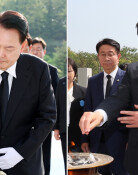U.S. considers permanently stationing missile defense system in S. Korea: official
U.S. considers permanently stationing missile defense system in S. Korea: official
Posted May. 21, 2015 07:24,
The United States is considering permanently stationing a terminal high-altitude area defense missile system in South Korea to help defend against North Korean nuclear and missile threats, a senior U.S. official said Tuesday.
The remarks came after U.S. Secretary of State John Kerry and former U.S. Secretary of Defense Chuck Hagel openly mentioned the need for THAAD deployment in South Korea during their recent visits to Seoul, sparking speculation that the Barack Obama administration might have started making the issue public in earnest.
Frank Rose, assistant secretary of state for arms control, verification and compliance, made the remark during a security forum hosted at Capitol Hill by the Institute for Corean-American Studies. "Although we`re considering the permanent stationing of a THAAD unit on the Korean Peninsula, we have not made a final decision and had formal consultations with the Republic of Korea (South Korea) on a potential THAAD deployment," he said, suggesting that the U.S. administration was weighing the costs and benefits of the proposed deployment. It was the first time that a key U.S. government official mentioned the possibility of permanently stationing the missile defense system on the Korean Peninsula. Since last year, Rose has been actively speaking in favor of the THAAD deployment in South Korea.
Regarding protests from other countries in the region, Rose said, "THAAD is a purely defensive system that would improve our ability to intercept short- and medium-range missiles from North Korea. It does not and cannot impact broader strategic stability with Russia or China."
Adm. James Winnefeld, vice chairman of the U.S. Joint Chiefs of Staff, said at a seminar at the Center for Strategic and International Studies on Tuesday that his country was interested in the possibility of using the THAAD system in order to build up the defense capabilities of the South and the U.S. Forces Korea against the North Korean threats. Regarding the possibility of consulting with Seoul over the possible THAAD deployment, the admiral said, "When it`s ripe, I`m sure we`ll get into that." He added that his country would take a very careful approach to the issue because it "respects" South Korea.
South Korea`s presidential spokesman Min Kyung-wook told reporters Wednesday that Seoul will make any decision on the THADD system "independently" in consideration of military effectiveness and national security interest. While he stressed that the U.S. has not made any relevant request yet, some observers are paying attention to a possible change in Seoul`s position.
Min said on March 11 that Seoul`s position on the THAAD issue was "3 Nos (No request from the U.S., No consultation on the issue, so No decision on the deployment)," drawing a clear line on the controversial issue. Given the previous position, his latest remarks indicate that Seoul`s presidential office is shifting toward preparing for public debates over the proposed THAAD deployment.







